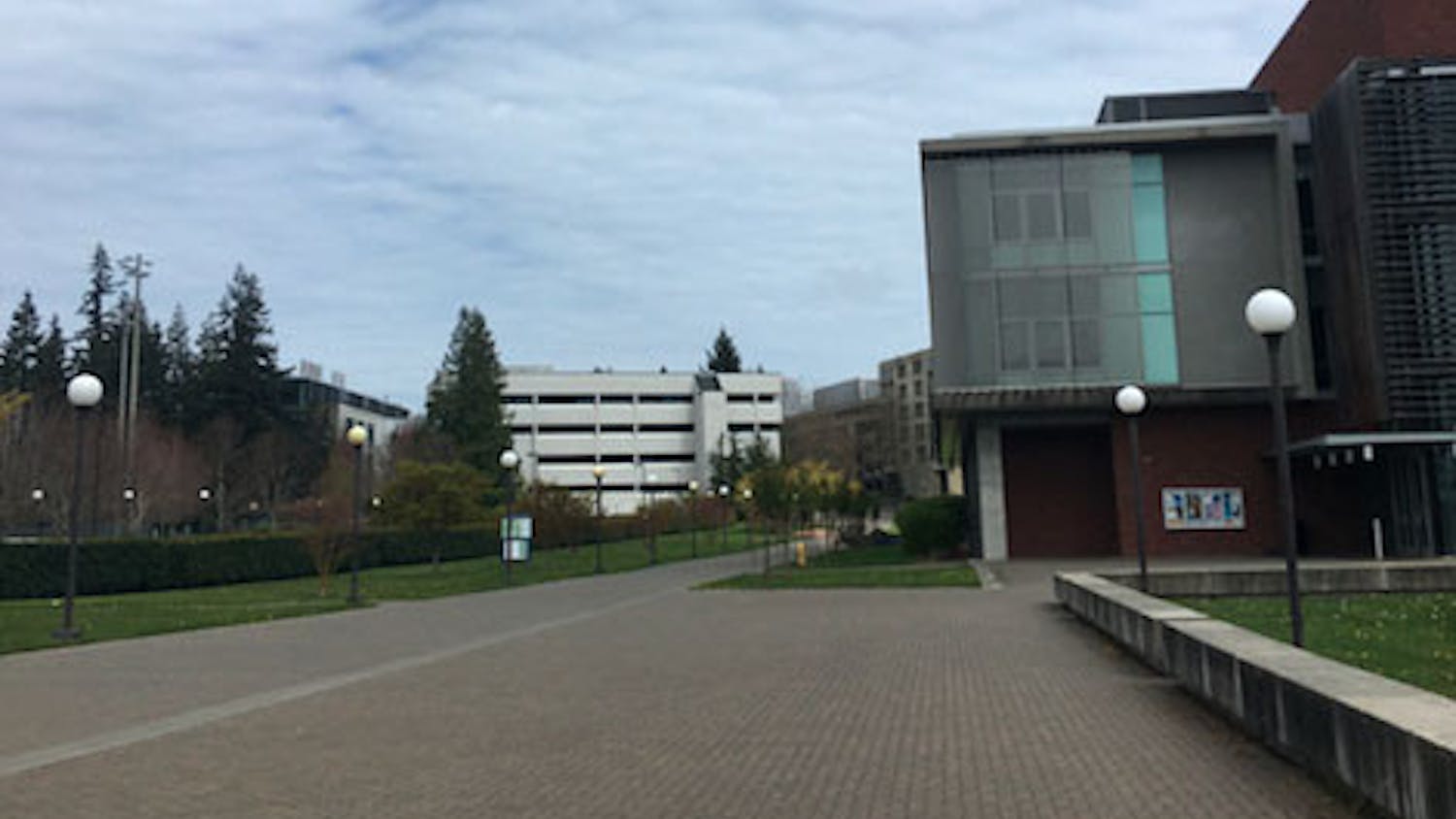
Illustration by Cole Sandhofer
A team of agencies within Whatcom County released an audit last month on how sexual assault cases are handled across the county. The audit focused on how service providers can better support survivors of sexual assault.
The Bellingham-Whatcom County Commission on Sexual & Domestic Violence decided to apply for funding to complete the audit after expanding their mission to focus on acts of sexual violence that occur outside of intimate partner relationships, Susan Marks, director of the DV Commission, said.
Marks said the DV Commission wanted to know if there were systemic problems in how agencies respond to sexaul assault.
“We knew the answer to that was probably yes, but we wanted to make this case to our city and county council,” Marks said.
Funding for the audit was garnered through a three-year federal grant with the U.S. Department of Justice, Marks said. The City of Bellingham and Bellingham Police Department partnered as the fiscal agents for the grant, Marks said.
The remaining year and a half covered by the grant will now cover implementation of recommendations from the audit, Elizabeth Montoya, project manager with the DV Commission, said.
The focus in the audit was change within agencies to better serve members of the community.
“If we can start with ourselves to untangle our own assumptions and biases around sexual violence, then that provides leadership to start changing our culture as a whole,” Karen Burke, executive director of Domestic Violence and Sexual Assault Services and member of the audit team, said.
According to the audit, DVSAS, Lummi Victims of Crime and Western’s Consultation and Sexual Assault Services provided advocacy services to 562 survivors between the three of them in 2017.
Through the audit, members of the team wanted to examine the biases our community may have about sexual assault.
“There is sort of some community bias to discredit sexual assault survivors. I personally think it’s really painful for us to accept how often our community members are being violently assaulted sexually,” Burke said. “And so, I think that’s one reason why we kind of just want to discredit it and think that doesn’t really happen,”
As illustrated in the audit, only 14% of rape reports within Whatcom County jurisdiction resulted in an arrest in 2017.
“It just is opening the eyes to where gaps are, and I feel like that has really given momentum to administration, and everybody around us, to show that this is important work,” Stephanie Wahlgren, forensic nurse coordinator at Peacehealth St. Joseph Medical Center, said.
Funding in the grant exists to provide sexual assault and domestic violence service and advocacy, Marks said.
“It was really important to do [the audit] so that we can come together as a community and identify ways that we can tangibly help a survivor experience the community’s support,” Burke said. “And ways that we can improve and how it is that we respond to sexual assault.”
The audit team identified recommendations for each agency involved in the audit on how they can improve their work on sexual assault cases.
At DVSAS, follow-ups with sexual assault survivors were not common after the initial hospital meeting, Burke said. Through the audit, survivors in focus groups expressed a desire to have follow-up outreach from DVSAS. A full-time employee with DVSAS is now dedicated to ensuring half of her work is in following-up with survivors, Burke said.
The same gap with follow-ups exists at St. Joseph hospital.
“Right now, a survivor will come to the emergency department and get an evidence collection and STI prevention from us. And then that’s it. There’s no follow-up,” Wahlgren said. “We have been instituting some follow-up calls, but it’s not a common practice yet. We’re trying. But it’s just me doing all the phone calls.”
Another gap identified in the audit is how long it takes to process sexual assault cases, sometimes two years before a case goes to court, Burke said.
“[We] hope with this audit that we’ll be able to make that happen in a shorter time frame, and that we keep victims much more informed in that process,” Burke said.
The audit allows for more resources to help sexual assault survivors with legal advocacy, Burke said. One of the which will be establishing someone to offer the survivor a timeline of legal processes, to help them make an informed decision, Burke said.
The main weakness at St. Joseph is delay in care, Wahlgren said. Currently, St. Joseph has 12 nurses who are trained to do forensic exams, all of whom work in the emergency department. When a survivor comes in for a forensic exam, a forensic nurse has to be pulled from the emergency department.
“There are times when there’s just nobody available,” Wahlgren said.
If there isn’t a forensic nurse on duty, St. Joseph will pay for the transportation of the survivor to another facility, if they choose. Wahlgren said some survivors choose not to have the exam at that point.
“That’s a problem,” Wahlgren said.“When survivors choose not to have an exam, law enforcement and legal, and even the defense questions their credibility, and questions if the rape actually happened.”
Wahlgren highlighted how this is a systemic problem in best serving survivors in sexual assault cases and treatment.
“This time delay can be very inconvenient for a person. They already just used all their courage to come walk through those doors and now we’re asking them to come back, or go to another hospital,” Wahlgren said.
Speaking on some of the gaps within the police department in handling sexual assault cases, Chief David Doll of Bellingham Police Department said the desire to gather evidence quickly in the investigation process may be harmful to a survivor.
“We are so interested in preserving evidence, because evidence is fleeting,” Doll said. “However, things like the victim statement can be gathered a day or so later, which can be better for the survivor,” Doll said.
“Officers should conduct only brief interviews with survivors immediately after an incident; in-depth interviews with survivors should take place after a few sleep cycles,” the audit report states. Doll said this gives the survivor time to recall the event and give further detail, as referenced in the
Other recommendations for the Bellingham Police Department and the Whatcom County Sheriff’s Office on how to communicate with survivors and obtain critical information from them include recording survivor’s interviews so they do not have to recall the event more than once.
Within each of the agencies, gender and racial bias were identified as gaps to service.
“We’re all raised in a culture that has all kinds of inherent oppressions that we have to be aware of,” Burke said.
Recommendations were made in the audit for agencies to participate in trainings to try to challenge biases, such as the Implicit Association Test. Funding also exists in the grant for law enforcement and prosecution training, Montoya said.
“Implicit bias and historical oppression lead to inequitable outcomes in the ways our community institutions serve and partner with marginalized communities, particularly Native communities,” the audit report states.
The ways in which agencies in Bellingham serve members of the Lummi Nation is a focus of DVSAS.
“Closing the gap with our racism and bias towards tribal survivors is something that is going to take an active and conscious willingness to learn,” Burke said. “And presence, so that we can be good partners.”
To ensure services provided from the Lummi Nation are supported, Burke said DVSAS will be working to be more of a partner and support to Lummi Victims of Crime.
“This year, we’re really focusing on making sure that we are working really in concert with Lummi Victims of Crime,” Burke said.
Survivors who are tribal members are always provided information of the services offered from LVOC when advocacy is done at the hospital, to ensure they have access to services they feel most comfortable with, Burke said.
Currently, no-contact orders and protection orders issued through a tribal judiciary committee are not enforceable off of identified tribal land, Doll said. Statewide, this issue is being looked at as lawmakers attempt to determine how these restrictions can be honored off of tribal land.
The audit will be presented to Bellingham City Council by Marks in May, during DVSAS’s yearly presentation to the council.
“We’re going to be working with all of the systems to help them develop some kind of plans timelines, and prioritization for how they want to go about implementing the recommendations,” Montoya said.
Moving forward, Doll said his department is preparing a timeline to address recommendations that will be presented to Bellingham City Council.
At St. Joseph, Wahlgren’s position as forensic nurse coordinator will transition into a supervisory position, as part of a recommendation from the audit.
Staffing models in the forensic department could change as well.“Right now, it’s just a title,” Wahlgren said, adding that it could become a permanent position in the future.
“I want to have someone on duty all the time,” Wahlgren said.
At DVSAS, Burke said they are working to help survivors heal without reliance on the criminal justice system.
“The survivor can come through healing and closure with or without that criminal justice process. Cause we don’t have control over that,” she said.
DVSAS does this by helping someone walk through the stages of healing from trauma, something that does not involve the criminal justice system, Burke said.
If you or someone you know has been affected by sexual assault, domestic or dating violence, there are resources for you. All services by agencies listed below are free of charge.
CASAS 360-650-3700
DVSAS 24-hour helpline: 360-715-1563
Lummi Victims of Crime 24-hour helpline: 360-312-2015

Lauren Gallup (she/her) is the spring 2021 managing editor of The Front. She is a fourth-year news/editorial journalism major, whose writing has been featured in Klipsun, 425 and South Sound magazines. Her reporting seeks to answer, provoke and increase understanding. You can find her retweeting great journalism @thelaurengallup or reach her at laurengallup.westernfront@gmail.com.





